EXPLORING URBAN SPACES
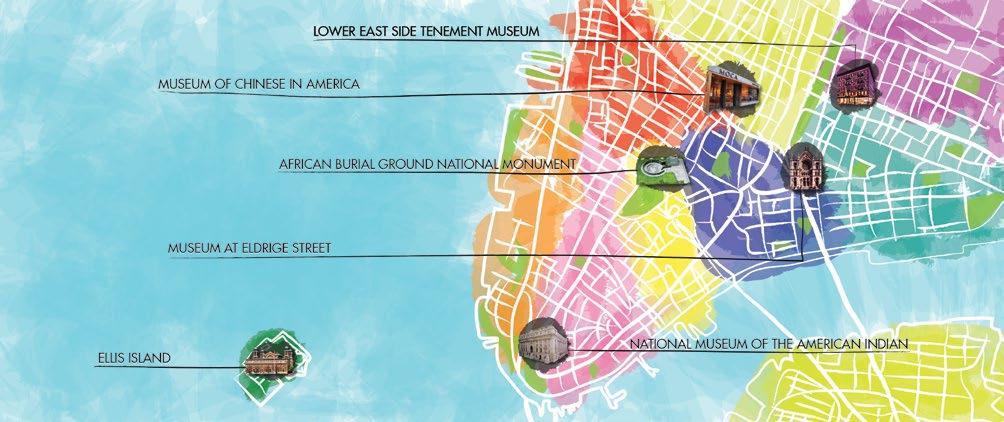
MIGRATION AND AMERICAN CULTURE / MEET ALEJANDRO
VELASCO / GALLATIN GLOBAL FELLOWS IN URBAN PRACTICE / SELECT GALLATIN FELLOWSHIPS / RESOURCES FOR PARENTS
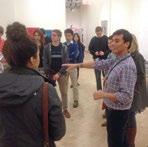
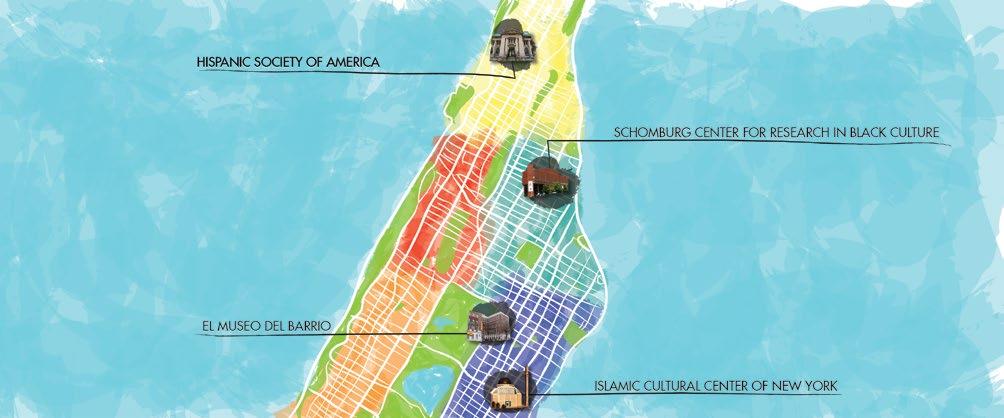
MIGRATION AND AMERICAN CULTURE
Michael Dinwiddie’s Migration and American Culture course examines the immigrant and migrant experiences of varied racial and ethnic groups in the United States as their political, social, and economic status alters. The course considers expectations, coping mechanisms, the forging of inter-tribal identity, the sociology of survival, and the concept of “otherness.” Students look at the guiding family narratives that inform their sense of self and community while developing an appreciation for the diversity of New York City and a deeper understanding of the impact of immigration and migration on American culture.
Pictured on the front and inside cover are some of the field locations that the class travels to during the semester: the African Burial Ground National Monument, Ellis Island, El Museo del Barrio, the Hispanic Society of America, the Islamic Cultural Center of New York, the Lower East Side Tenement Museum, the Museum of Chinese in America, the Museum at Eldridge Street, the National Museum of the American Indian, and the Schomburg Center for Research in Black Culture.
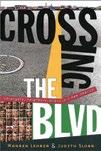
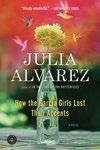
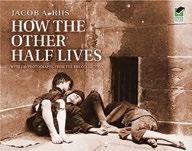
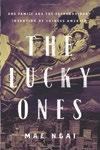

SELECT BIBLIOGRAPHY: Crossing the BLVD by Warren Lehrer and Judith Sloan; How the Garcia Girls Lost Their Accents by Julia Alvarez; How the Other Half Lives by Jacob Riis; The Lucky Ones by Mae Ngai; The Warmth of Other Suns by Isabel Wilkerson
SAVE THE DATES
APRIL 2
Dear Parents,
Even though it hardly feels it at the moment in New York, spring is on the horizon. As this issue of Parents Update shows, Gallatin faculty and students continue to explore and understand urban spaces—in New York, in the case of Michael Dinwiddie’s Migration and American Culture course; in NYC and Buenos Aires in Alejandro Velasco’s co-located course Art and Politics in the City; and in Berlin and New York through the Gallatin Global Fellowship in Urban Practice (GGFUP) Program.
On our cover is an illustration of some of the locales students visited through Michael Dinwiddie’s course, which offers students a taste of New York and some of the immigrant cultures that have helped shape our city.
On page 4, you can read about Latin American scholar and Gallatin faculty Alejandro Velasco who is teaching a co-located course for students in Buenos Aires and New York which brings politics, art, and urban architecture into conversation.
We want Gallatin students and their parents to be aware of the many funding sources the School has available to support a wide range of scholarship. On page 6, read about our newly minted Gallatin Global Fellowship in Urban Practice Program, and hear from former fellows about their projects and plans. On page 5, please find other fellowship opportunities for your student.
Also included in this issue is a list of whom parents can contact—in Advising, Student Affairs, Student Life, and Health and Wellness—should you or your student need assistance.
For parents whose students are graduating in the spring, mark your calendars for May 21st, the day of the Gallatin graduation!
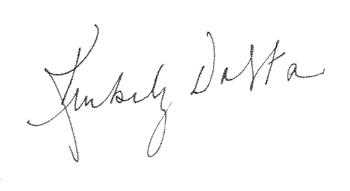
Sincerely,
Kim DaCosta
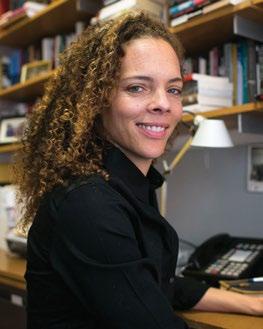
ALEJANDRO VELASCO
FINDING HISTORY IN THE STREETS
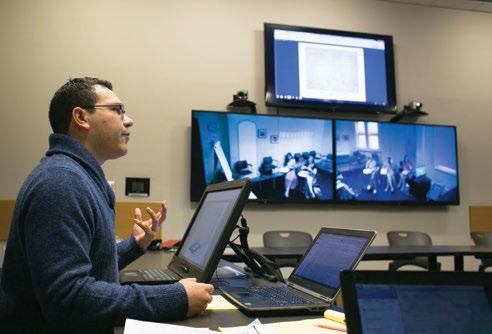
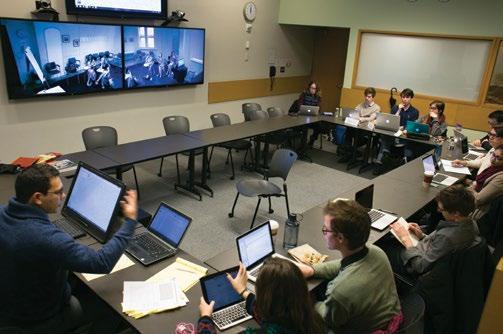
H“istory isn’t ‘the past’—history is change over time,” says Gallatin faculty Alejandro Velasco.
“Thinking historically means tracking differences and continuities over time, and imagining how those trajectories help us make sense of issues in the present.”
In his search for these trajectories in his native Venezuela, Velasco has focused his scholarly work on urban politics, coalition building, resistance, and repression by closely considering the country’s largest public housing community, the Caracas barrio known as the 23 de Enero (January 23rd).
In the summer of 2015, his book Barrio Rising: Urban Popular Politics and the Making of Modern Venezuela (University of California Press, 2015) will be published. The project, which has evolved significantly since Velasco first arrived at Gallatin in 2007, draws on the 23 de Enero barrio to trace the history of Venezuelan democracy from the late 1950s through the presidency of Hugo Chávez and his Bolivarian Revolution.
“The interplay between formal and informal that I see in the lived environment of this neighborhood—in its housing, politics, even culture—is the essence of the kind of interdisciplinary education that we teach at Gallatin, always blending formal design and informal discovery,” he says.
In a new exploration of how urban space is shaped and understood, this time in Argentina, Velasco is currently co-teaching with NYU
Buenos Aires faculty and art historian Florencia Malbrán the colocated course Art and Politics in the City. The course—only the second of its kind run by NYU—is held simultaneously in both New York and Buenos Aires via video conference, using specially designed classrooms that accommodate professors and students at both locations.
With a total enrollment of 22 students, 11 in New York and 11 in Buenos Aires, undergraduates are mapping and exploring urban arts as they intersect with local politics. Students in New York consider five neighborhoods—Bushwick, Chelsea, East Harlem, the Lower East Side, and Williamsburg—while students in Buenos Aires look at the areas of Chacarita, Avenida de Mayo, and San Telmo. They receive training on mapping software and portable geographic information system (GIS) devices to conduct field work and create an archive of murals, graffiti, performances, and installations. The field work is supplemented by readings in history, art criticism, and urban studies.
“When I came to Gallatin,” says Velasco, “I knew it was an interdisciplinary school, but I wasn’t really prepared for how interdisciplinary it would be. Even in this small space, the conversations that happen are always generative of new ideas that I am able to draw from and incorporate into my own research,” he says. “My students always drive that interdisciplinary generation of new ideas.” In New York and Buenos Aires, Velasco again has the chance to see what this kind of collaboration may yield.
STUDENT FUNDING :
GLOBAL FELLOWSHIPS
Gallatin students can apply for these fellowships in order to develop research experiences that relate to their concentrations or senior colloquium.
WHO IS ELIGIBLE?
Gallatin undergraduate and graduate students
WHAT DOES THE FELLOWSHIP SUPPORT?
Funding up to $5,000 is given to study Chinese language at NYU Shanghai as part of the Summer Abroad in Shanghai program.
WHAT’S THE DEADLINE?
Early March
GALLATIN CHINA FELLOWSHIP
WHO IS ELIGIBLE?
Gallatin undergraduate and graduate students
WHAT IS COVERED?
Funding of up to $5,000 is given to pursue extended research projects in the human rights field while working at sponsor organizations in New York, Berlin, or Madrid. Read more about this fellowship on pages 6-7 of this issue.
WHAT’S THE DEADLINE?
November 1
GALLATIN GLOBAL FELLOWS IN URBAN PRACTICE
WHO IS ELIGIBLE?
Gallatin undergraduate and graduate students and other NYU undergraduates and graduates in select Schools and programs
WHAT DOES THE FELLOWSHIP SUPPORT?
Funding of up to $5,000 is given to pursue extended research or experiential learning projects or internships in the human rights field.
WHAT’S THE DEADLINE? November 30
GALLATIN GLOBAL FELLOWSHIP IN HUMAN RIGHTS
NYU GALLATIN AND NYU AFRICA HOUSE SUMMER FELLOWSHIP
FOR MORE INFORMATION, PLEASE GO TO GALLATIN.NYU.EDU AND SEARCH FOR GLOBAL STUDY>GLOBAL FELLOWSHIPS
WHO IS ELIGIBLE?
Gallatin undergraduate and graduate students
WHAT IS COVERED?
Funding of up to $5,000 is given to pursue summer research in Africa that is closely linked to an existing or developing concentration; prior related coursework is expected.
WHAT’S THE DEADLINE?
March 30
GALLATIN GLOBAL FELLOWSHIP IN URBAN PRACTICE
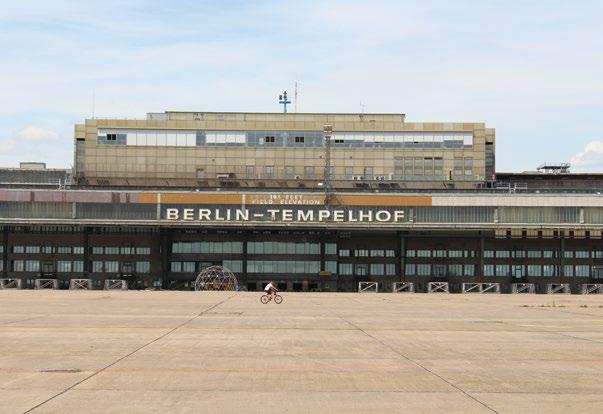
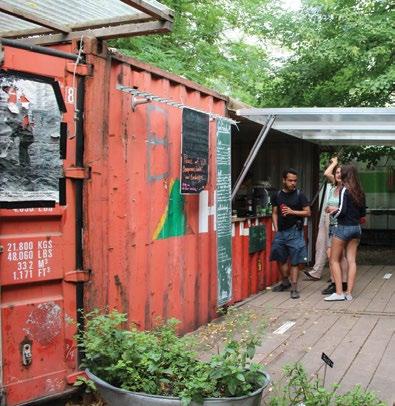
I“wanted to see what urban development looked like on the ground,” says Idan Sasson (BA ’15) who won a Gallatin Global Fellowship in Urban Practice (GGFUP) to travel to Berlin in 2014. His project considered the proposed development of the city’s Tempelhof area and the popular movement to keep Tempelhof Airfield undeveloped and free for public use.
Sasson was one of the inaugural group of urban fellows which also included Sophie Lasoff (BA ’16) and Henry Topper (BA ’15), who did research in New York and Berlin, respectively.
The Gallatin Global Fellowship in Urban Practice program began in 2014 in order to establish sustained, collaborative, and reciprocal relationships between universities and community organizations. Each year, stipends of up to $5,000 are given to up to ten advanced undergraduate and graduate students to pursue extended summer research projects
while apprenticing with sponsor organizations in New York and Berlin and, beginning in 2015, Madrid.
“These three cities are, in different ways, at the forefront of exciting developments in urban democracy,” says Gianpaolo Baiocchi, director of the Urban Democracy Lab. “With this program, we wanted to go beyond the traditional model of service-learning, or even internships. It was important to us that students bring something meaningful to organizations through their research.”
In close consultation with the sponsoring partner organizations, GGFUP fellows gain on-the-ground experience in fields such as housing advocacy, urban agriculture, community-based arts training, and participatory design.
“This experience was empowering and challenging and gave me a taste of academic life that is unique and rare for undergraduate students,”
This experience was empowering and challenging and gave me a taste of academic life that is unique and rare for undergraduate students.” –Idan Sasson (BA ’15)
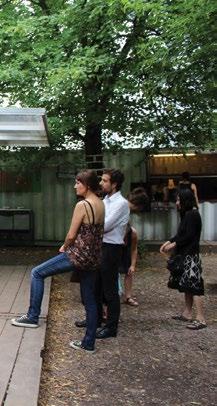
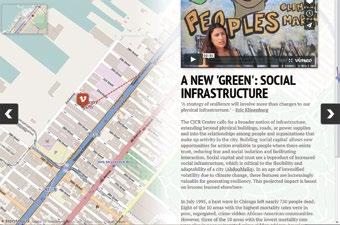
Pictured (left to right): An external view of Berlin’s Tempelhof Airport, courtesy of Idan Sasson; the cafe at Prinzessinnengarten, a community garden in the heart of Berlin’s Kreuzberg neighborhood, courtesy of Henry Topper; and an image of Sophie Lasoff’s online project “A Grassroots Model for Climate Resiliency,” based in Sunset Park, Brooklyn
says Sasson. “It highlighted to me the fact that this kind of urban development is not beyond any politics and that urban sustainability is more complicated than just protecting ourselves from a hurricane or just planting a few more trees.”
In the spring semester of the year before they begin their research, fellows attend a two-credit seminar during which they are trained in research methodologies and introduced to the scholarly literature on their cities and topics of study. The seminar culminates in a weekto-week research plan devised in collaboration with faculty mentors and sponsor organizations. In the summer, fellows engage in 8 to 10 weeks of full-time work on their summer research project with a partnering community organization. The fellows create final, online projects that are hosted permanently on the Urban Democracy Lab site at urbandemos.org.edu.
CONTACTS FOR PARENTS
OFFICE OF STUDENT AFFAIRS
Can help provide answers about leaves of absence, school/life balance, housing issues, semester withdrawal, adjusting to college, and more
Director of Student Affairs: Rahul Hamid 212-992-7750 | rahul.hamid@nyu.edu
OFFICE OF STUDENT SERVICES
Can assist with registration and financial aid issues
Director of Student Services: Sherese Williams-Spencer 212-998-7369 | sherese.williams@nyu.edu
OFFICE OF ADVISING
Can assist with academic planning, developing a concentration, choosing courses, degree requirements, policies, academic performance, and more
First Year Class Adviser: Yevgeniya Traps 212-992-9838 | yevgeniya.traps@nyu.edu
Second Year Class Adviser: Cyd Cipolla 212-992-7758 | cyd.cipolla@nyu.edu
Third Year Class Adviser: Matthew Gregory 212-992-9830 | matthew.gregory@nyu.edu
Fourth Year Class Adviser: Meredith Theeman 212-992-7746 | meredith.theeman@nyu.edu
Transfer Student Adviser: Joshua Shirkey 212-998-7343 | joshua.shirkey@nyu.edu
Assistant Dean of Advising: Amy Spellacy 212-992-9837 | amy.spellacy@nyu.edu
HEALTH AND WELLNESS
Assists students with a broad spectrum of wellness issues including illness, stress, and other concerns
Director of Student Affairs: Rahul Hamid 212-992-7750 | rahul.hamid@nyu.edu
Associate Director of Student Affairs: Nicholas Lanzieri 212-998-7375 | nicholas.lanzieri@nyu.edu
NYU PARENTS COUNCIL
Gallatin’s Director of Development: Maureen Bannon 212-998-6996 | maureen.bannon@nyu.edu

